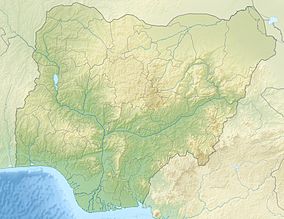
Oduduwa was a Yoruba divine king, legendary founder of the Ife Empire and a creator deity (orisha) in the Yoruba religion. His earthly origins are from the village of Oke Ora According to tradition, he was the holder of the title of the Olofin of Ile-Ife, the Yoruba holy city. He ruled briefly in Ife, and also served as the progenitor of a number of independent royal dynasties in Yorubaland.
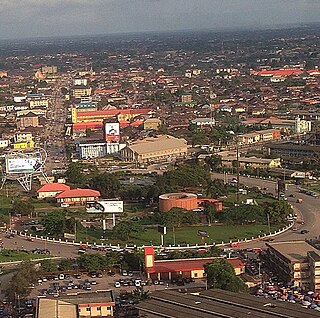
Benin City is the capital and largest city of Edo State, southern Nigeria. It is the fourth-largest city in Nigeria according to the 2006 census, after Lagos, Kano, and Ibadan.
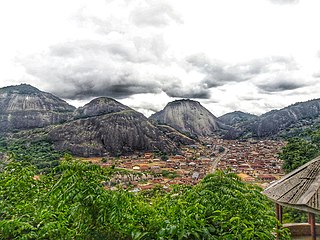
Ondo State is a state in southwestern Nigeria. It was created on 3 February 1976 from the former Western State. Ondo borders Ekiti State to the north, Kogi State to the northeast for 45 km, Edo State to the east, Delta State to the southeast for 36 km, Ogun State to the southwest for 179 km, Osun State to the northwest for 77 km, and the Atlantic Ocean to the south. The state's capital is Akure, the former capital of the ancient Akure Kingdom. The State includes mangrove-swamp forest near the Bights of Benin.
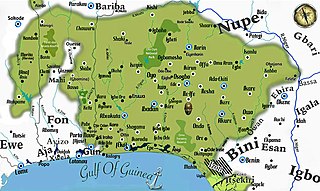
Yorubaland is the homeland and cultural region of the Yoruba people in West Africa. It spans the modern-day countries of Nigeria, Togo and Benin, and covers a total land area of 142,114 km2 (54,871 sq mi). Of this land area, 106,016 km2 (74.6%) lies within Nigeria, 18.9% in Benin, and the remaining 6.5% is in Togo. Prior to European colonization, a portion of this area was known as Yoruba country. The geo-cultural space contains an estimated 55 million people, the majority of this population being ethnic Yoruba.
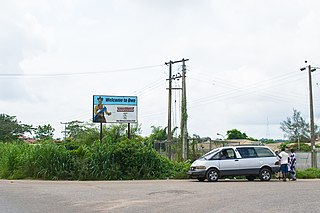
Owo is a local government area in Ondo state, Nigeria. Between 1400 and 1600 CE, it was the capital of a Yoruba city-state. The local government area has a population of 222,262 based on 2006 population census.
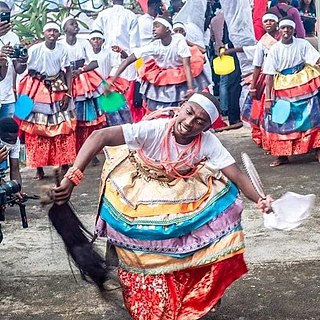
The Itsekiri are one of the fundamental Yoruba subgroups in Nigeria's Niger Delta area. They originate from Ile-Ife and speak a Yoruboid language and can be found in Ondo, Edo and Delta State. The Itsekiris presently transcends a population of over 1 million people and live mainly in parts of Ondo, Edo and majorly in the Warri South, Warri North and Warri South West local government districts of Delta State on the Atlantic coast of Nigeria.
Ọ̀rànmíyàn, also known as Ọranyan, was a legendary Yoruba king from the kingdom of Ile-Ife, and the founder of the Oyo empire. Although he was the youngest of the descendants of Oduduwa, he became the prime heir of Oduduwa upon his return to claim his grandfather's throne.
The Western Apoi tribe live in Ondo State, Nigeria. The tribe consists of nine settlements: Igbobini, Ojuala, Ikpoke, Inikorogha, Oboro, Shabomi, Igbotu, Kiribo and Gbekebo. The Apoi inhabit higher ground than most of the other Ijaw tribes. They speak a southeastern dialect of the Yoruba language called Apoi which is not very different from the Ikale dialect. The Apoi might have undergone a linguistic shift centuries ago from an Ijo based dialect to Yoruba due to intermarriages with the Ikale, and isolation from the Niger Delta due to their location inland and away from the main body of Ijo people. They are bordered to the north and east by the Ikale and to the west by the Ilaje. The clan shares the southern border with the Arogbo.
Akoko Edo is a Local Government Area in Edo State, Nigeria. Its headquarters is in the town of Igarra. It has an area of 1,371 km2 and a population of 262,110 at the 2006 census. It consist of the Akoko people that are split between Ondo and Edo states. Most recognize as Yoruba and bear names identical with their counterparts in Akoko Ondo. The Benin conquests during the reign of Oba Ozolua (1483-1504) established its first settlements in the region, while other people migrated there for fortunes, including the Bida. Of the Igbirra and Idah from the North and East, the war which Oba Esigie fought in 1515-1516 with the Attah of Idah would have also contributed to migration into the area.
Ogun Waterside is a Local Government Area in Ogun State, Nigeria. It is the only area of the state with a coastline on the Bight of Benin and also borders Lagos Lagoon. Its headquarters are in the town of Abigi at 6°29′N4°24′E. Other towns and villages in the local government include: Ilushin, Lukogbe, Iwopin, Olojumeta, Imakun Omi, Ode Omi, Ibu, Itebu Manuwa, Ibiade, Efire, Lomiro, Oni, Ayede, Igele, Ayila and Irokun among others.
Odigbo is a Local Government Area in Ondo State, Nigeria. Its headquarters are in the town of Ore.
Okitipupa is in Nigeria and part of the Ikale-speaking nation in Ondo State. Okitipupa Government headquarter is located in Okitipupa Major town with a university, Olusegun Agagu University of Science and Technology (OAUSTECH) which commenced academic sessions in 2010–11.
Irele is a local government area in Ondo State, Nigeria. Its headquarters are in the town of Ode-Irele. It was originally part of the old Ikale LGA, which was split into Irele and Okitipupa LGAs. It has an area of 963 square kilometres (372 sq mi) and had a population of 145,166 at the 2006 census.
The Itsekiri language is a major branch of the Yoruboid group of languages, which as a group, is a key member of the Volta–Niger sub-family of the Niger–Congo family of African languages. Itsekiri is spoken by nearly 900,000 people in Nigeria as a first language and by many others as an additional language notably in the Niger Delta and in parts of Edo and Ondo states of Nigeria. The other key members of the Yoruboid group are Yoruba and Igala along with the various Yoruba dialects spoken in Benin and Togo.

The Akure Kingdom is a traditional state with headquarters in Akure, Ondo State, Nigeria. It is the successor to an ancient Yoruba city state of the same name. The ruler bears the title "Deji of Akure".

Igbara-Oke, popularly referred to as Nodal Town, is an Ekiti town in Ondo State, Nigeria. It is the headquarters of Ifedore Local Government Council. The total population for the local government area was 176,372 as at 2006. Igbara-Oke is a Yoruba town and the inhabitants are largely engaged in agriculture. Igbara-Oke is a town that shares border with three states in Nigeria, Ondo, Osun and Ekiti states. Igbara-Oke is a tripatite town. An entry point into Ondo State when coming from either Osun or Ekiti State. A land of peace, unity, love and harmony. A land that is viable for industrial and infrastructural development. Igbara-Oke has Thirteen (13) Satellites towns and villages.
Oba Feyisara John Odimayo was the reigning king of Ode-Irele in Ondo State, Nigeria from 1976 to 1993. He was from a group of people called 'Ikale' a sub tribe of the Yoruba tribe in Nigeria.

The Ekiti people are one of the largest historical subgroups of the larger Yoruba people of West Africa, located in Nigeria. They are classified as a Central Yoruba group, alongside the Ijesha, Igbomina, Yagba and Ifes. Ekiti State is populated exclusively by Ekiti people; however, it is but a segment of the historic territorial domain of Ekiti-speaking groups, which historically included towns in Ondo State such as Akure, Ilara-Mokin, Ijare, and Igbara-oke. Ogbagi, Irun, Ese, Oyin, Igasi, Afin and Eriti in the Akoko region, as well as some towns in Kwara State, are also culturally Ekiti, although belong in other states today.
Ilara-Mokin is located in a central part of Ifedore local government of Ondo State, Nigeria. Ilara-Mokin is about 12 km from Ondo state capital, and has Ipogun, Ipinsa, Ikota, Ibule-Soro and Ero as neighbouring towns.

Ogiame Atuwatse III is a Nigerian traditional king of the Kingdom of Warri in the Delta State. He was born Utieyinoritsetsola Emiko, also known as Tsola Emiko, on April 2, 1984 to Olu Atuwatse II, the 19th Olu of Warri, and Gladys Durorike Emiko. He is also a descendant of Olu Akengbuwa.
